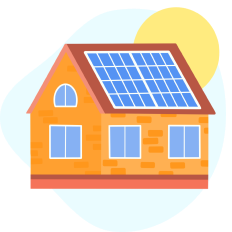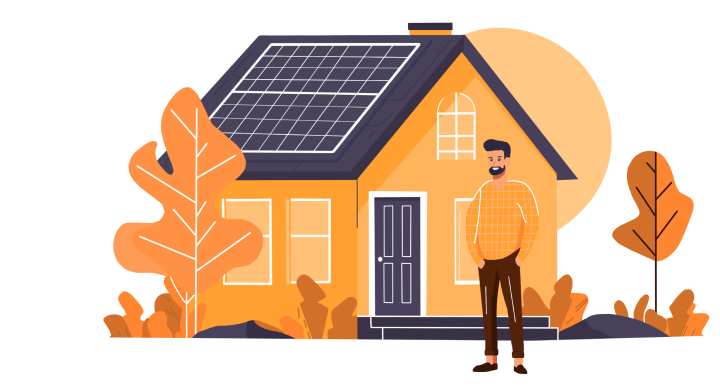When thinking about commercial solar power installation, the range of benefits could be as high as your current electricity bill. To give you a better idea, investing in solar power for your commercial property can slash your energy costs, reduce your carbon footprint and offer an edge through sustainable energy.
However, what else is there to know about setting up commercial solar panels?
Consideration #1: Assess your building's solar viability.
Ensure your roof can support solar panels and is properly oriented.
Before committing to a commercial solar power installation, start by verifying that your roof can handle the added weight of solar panels and is correctly positioned to capture maximum sunlight.
A crucial first step is to have structural engineers, perhaps from solar energy companies, review your roof's capability to support the additional weight. Typical solar panels can weigh around 40 pounds each, so it's essential to ensure your roof won't buckle under strain.
Next, consider the angle of your roof—ideally, it should face south to capture the most sunlight throughout the day after solar installation. If south-facing isn't an option, east and west orientations can also be effective with certain mounts like tilt frames.
Evaluate the available space and potential shading issues.
You should also take into account the available space for panels and identify any shading problems that could affect performance.
First, measure the surface area of your roof where panels could be installed.
Larger, unbroken spaces usually yield optimal results with more energy efficiency, but even smaller segmented areas can work with a well-designed system.
After that, identify any potential obstacles that might cast shadows, such as chimneys, trees or nearby buildings. These shadows can significantly reduce the efficiency of your panels, making it essential to either take care of them or position the panels in a way that minimizes shading.
Consideration #2: Take note of the local regulations.
Investigate local zoning laws and secure the necessary permits.
Each region has its specific regulations and ordinances you must follow to have solar panels installed. Generally, you would have to consult your local government's zoning office or building department to identify regulations for commercial solar power installation.
Failing to comply with local laws can lead to fines, forced removal of solar energy solutions or even legal action. This measure not only ensures that your solar panel installation is legally compliant but also saves you from costly setbacks and headaches down the line.
Consideration #3: Select a reliable solar provider.
Ensure the provider is licensed and has positive reviews.
For commercial solar power installation, opting for DIY may not be feasible due to the sheer size of the project and the complexity of the plans. However, when going for a solar installation company, it's crucial to verify their credentials and view customer feedback to ensure high-quality service.
Check the provider's licensing and certification through official channels such as state licensing boards or certification websites. A licensed installer not only adheres to industry standards but also provides a layer of protection against any legal issues or subpar workmanship.
Next, read customer reviews and testimonials on platforms like Google Reviews and the Better Business Bureau. Genuine feedback from previous clients offers valuable insights into the provider's reliability, professionalism and overall service quality.
Compare quotes from reliable local providers.
When it comes to solar energy for businesses, you can request quotes from reputable providers in your area to understand the range of services and pricing. Look beyond the cost and examine aspects such as warranty terms, installation timelines and the quality of materials used for commercial solar installation.
For homeowners, avenues like Solar Energy Host offer a secure way to compare quotes and select competitive solar energy installation offers. We not only simplify the decision-making process but also help ensure that you get connected with local providers who have been vetted for excellence.
Consideration #4: Calculate the financial impact.
Determine the financial benefits by comparing the initial costs against long-term savings.
Consider the upfront investment, which includes the price of the panels, the labor involved in installing solar panels on commercial buildings and any necessary permits or inspections. Although the initial outlay can be substantial, it's essential to look beyond the upfront price to the extended horizon.
Over time, the savings generated from reduced energy bills can offset these initial costs significantly.
Businesses often face fluctuating energy prices, which can impact budget predictability. Commercial solar power installation can help to stabilize these costs, offering predictable and usually lower energy expenditure each month.
Additionally, installing solar panels on roof segments in your building can often increase property values, providing another layer of long-term financial benefit.
Frequently Asked Questions (FAQ)
What are the financial incentives available for commercial solar installations?
Whether it's a residential or commercial solar power installation, government rebates can provide significant cash back on the total installation cost, while tax incentives like the Investment Tax Credit (ITC) can lower your annual tax liability.
Additionally, renewable energy credits may be available, allowing businesses to generate extra income by selling these credits to utility companies that need to meet renewable energy targets.
How do I calculate the return on investment (ROI) for a commercial solar power system?
One way to calculate ROI is by comparing the total solar power cost to the expected reduction in energy bills over the lifespan of the system.
Simply determine the total cost to install solar setups, including equipment, labor and permits. Next, estimate the amount you'll save on energy bills each month and multiply this by the expected lifespan of your solar panels, typically around 25 years.
Finally, subtract the cost of the solar installation process from these lifetime savings to get your net gain.
However, for a more precise calculation, you might also consider factors like maintenance costs and potential increases in energy prices.
What types of solar panels are best for commercial installations?
Monocrystalline panels are often preferred for commercial solar power installation where space may be limited, as their high efficiency allows for maximum energy output per square foot. Polycrystalline panels, being less efficient but more affordable, are suited to larger spaces where you can install more panels to achieve similar energy output.
Lastly, thin-film panels are another option from solar power contractors, offering flexibility and lightweight characteristics but at a lower efficiency rate, making them ideal for specialized applications.
Harness the power of the sun with Solar Energy Host.
We are your trusted partner, offering a straightforward and secure platform that shows you reputable solar providers and their competitive quotes for solar panel installation. Simply enter your basic information, compare quotes, and choose a suitable offer to start saving today!




















